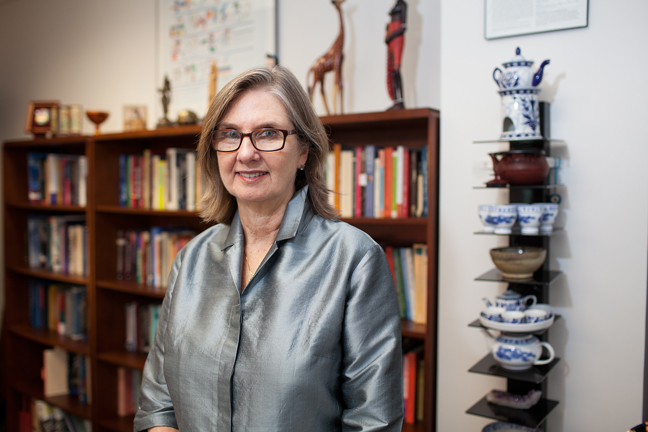
The American College of Epidemiology has awarded Linda B. Cottler, Ph.D., M.P.H., its 2015 Special Award for Outstanding Contributions Through Systemic Epidemiologic Approaches to Improving Health. She will be honored at the organization’s annual meeting in Atlanta in September.
In her research, Cottler, the dean’s professor and chair of the University of Florida department of epidemiology in the College of Public Health and Health Professions and the College of Medicine, has focused on underrepresented populations. Her studies, which have been funded by the National Institutes of Health continuously since 1989, include the development of culturally reliable and valid measures for identifying substance use and psychiatric disorders and their risk factors; innovative methods for conducting national surveys of high risk behaviors; and community-based, peer-delivered interventions to reduce HIV risk behaviors and substance abuse.
“Dr. Cottler exemplifies the very best in methods in her epidemiological research, and in her teaching, service and mentoring,” said award nominator Catherine W. Striley, Ph.D., M.S.W., M.P.E., an assistant professor in the UF department of epidemiology. “She is an outstanding leader and an internationally known and recognized scientist in the fields of psychiatric epidemiology, classification of mental disorders, addiction science and HIV prevention.”
Cottler is the founding director of HealthStreet, a community engagement program that seeks to reduce disparities in health care and improve access to research studies among people who are medically underserved by meeting people out in the community and linking them to services and research opportunities.
PHHP’s associate dean for research, Cottler has conducted several international studies in countries such as Afghanistan, Australia, India, Kenya and Taiwan. She directs an NIH-funded Fogarty International Center Training Program that offers behavioral health training to colleagues in three Indian cities and increases research opportunities between UF and Indian partners. She is the recipient of several professional awards, including the Scientific Achievement Award from the National Center for Responsible Gaming and the College on Problems of Drug Dependence’s Marian W. Fischman Memorial Award.
Cottler began making her mark on epidemiology research in the 1980s with a study of the prevalence and incidence of mental disorders in St. Louis, a study which brought psychiatric epidemiology to the fore as a major discipline in psychiatric research, said colleague Wilson Compton, M.D., M.P.E., the deputy director of the National Institute on Drug Abuse of the National Institutes of Health.
“She followed up with a series of drug use studies focusing on vulnerable populations and how to engage them in treatment and to understand the risk factors and behavior of persons who are out of treatment,” Compton said. “Reaching hidden populations is a major theme of her work and she has developed programs to engage multiple populations in health care research. That has been a tremendous contribution to epidemiology and public health over the past 25 years.”
Another of her major contributions has been through her mentoring of numerous pre- and postdoctoral fellows, Compton said.
“Dr. Cottler is a wonderful mentor,” he said. “She is a very generous person who is always good at helping new trainees get excited about their work and learn about the rigorous methodologies they need to apply to their research.”

